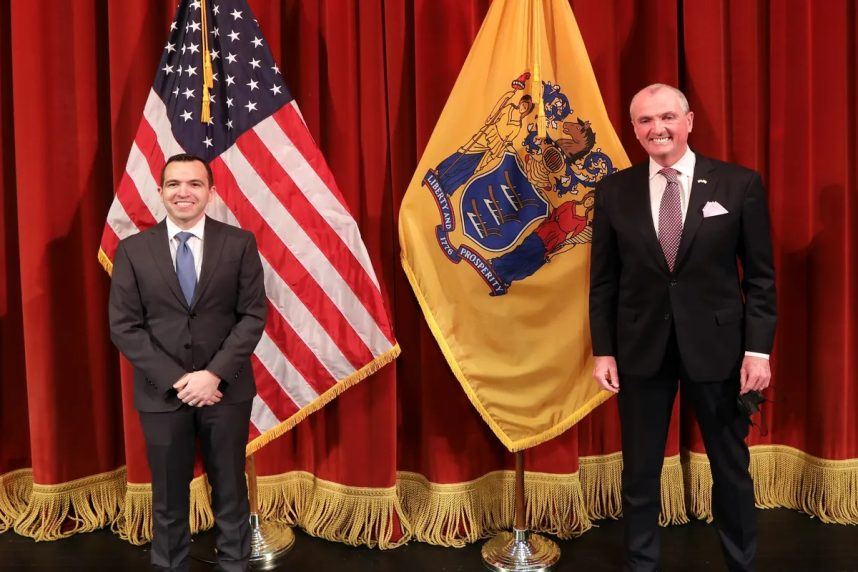New Jersey Attorney General and Unite Here Ask Court to Dismiss Smoking Lawsuit
Posted on: April 30, 2024, 12:50h.
Last updated on: April 30, 2024, 12:56h.
New Jersey Attorney General Matthew Platkin, representing the legal interests of Democratic Gov. Phil Murphy, has asked New Jersey’s Superior Court to dismiss a lawsuit against the state challenging a smoking law that allows casinos in Atlantic City to designate up to 25% of their gaming space for indoor tobacco consumption.

The United Auto Workers (UAW) and Casino Employees Against Smoking’s Effects (CEASE) filed a lawsuit in the Superior Court in early April naming Murphy and New Jersey Health Commissioner Kaitlan Baston as defendants. The litigation alleges that New Jersey’s 2006 Smoke-Free Air Act violates the state constitution.
The UAW represents table game dealers at three casinos, jobs which are most exposed to dangerous secondhand smoke inside the nine casinos. CEASE is a grassroots organization consisting of casino workers who demand a clean-air workplace.
In his brief to the Superior Court, Platkin argues the lawsuit is meritless. He opined that the 2006 smoking law that provides exemptions for casinos “does not infringe on any purported constitutional right to safety.”
Unions at Odds
Attorneys for UAW and CEASE in the lawsuit against the state point to wording in the New Jersey Constitution that says “all persons … have certain natural and unalienable rights, among which are … pursuing and obtaining safety and happiness.” The smoking law, the lawsuit claims, violates that condition.
The lawsuit asserts the state constitution also mandates that the legislature not pass any special laws or grant to any corporation exclusive privilege or immunity.
In this case, rich corporate casinos are excluded from the Smoke-Free Air Act, giving them the exclusive right to endanger the lives of their workers,” the lawsuit alleges.
While the UAW is bankrolling the lawsuit that includes CEASE, another union in Atlantic City, Unite Here Local 54, opposes closing the smoking loophole. Unite Here brass says a smoking ban would be “catastrophic” to the Atlantic City casino industry and threaten a third of the resort jobs.
Unite Here represents casino workers employed in nongaming positions like housekeepers, waiters, kitchen employees, bellmen, and porters.
A total smoking ban would place thousands of jobs at risk, endangering the wages, health and welfare benefits, and retirement benefits of Local 54 members and their families,” the union wrote in its court response.
Employment attorney Nancy Erika Smith, who filed the lawsuit on UAW and CEASE’s behalf, told the Associated Press that she’s “never seen a union fight against the health and safety of their members, not once.”
Unite Here Local 54 President Donna DeCaprio rejected that assertion.
“We support the health and safety of our members, and believe that improvements to the current work environment must be made,” DeCaprio responded. “A balance needs to be reached that will both protect worker health and preserve good jobs.”
Smoking Sections Fuel Revenue
DeCaprio contends that between 50% to 72% of the gross gaming revenue (GGR) won by the casinos last year was derived from smoking sections. The nine casinos collectively won more than $2.84 billion from their physical slot machines and table games in 2023, meaning the union boss thinks at least $1.42 billion came from smoking areas.
CEASE rejects the accuracy of that claim and points to independent research conducted in 2022 by Las Vegas-based C3 Gaming that found the exclusion of smoking “no longer causes a dramatic drop in gaming revenue.”
The UAW says the revenue talking points made by Unite Here have no relevance in its legal filing challenging the state’s smoking law. Murphy, however, said recently that he thinks the matter should be resolved through legislative action, not a courtroom.
Related News Articles
Atlantic City Casino Smoking Ban May Be Considered After Election
Atlantic City Casino Union Issues Support for Smoking Ban
Big Tobacco Tied to New Jersey Assembly Smoking Debate Leader
Most Popular
Virgin Taking Over Las Vegas Casino Ops, Mohegan Out
Times Square Casino Meets Stiff Opposition in New Poll
Most Commented
-
Cracks Emerging on Las Vegas Strip Says Analyst
— April 30, 2024 — 19 Comments -
Mega Millions Reportedly Mulling Substantial Ticket Price Increase
— April 16, 2024 — 11 Comments -
Caesars Open to Selling ‘Non-Core’ Casinos to Reduce Debt
— May 1, 2024 — 8 Comments
















Last Comment ( 1 )
1000's of jobs at risk? I guess it is OK that the casinos over the years have eliminated 1000's of jobs when it was OK for them. Now all of a sudden they care about eliminating jobs? What a bunch of hog wash! Oh, and the law suit is meritless? Then why do you want it dismissed. Murphy has proven something I have known for years! In NJ there is no difference in the political parties. None of them do the right thing!